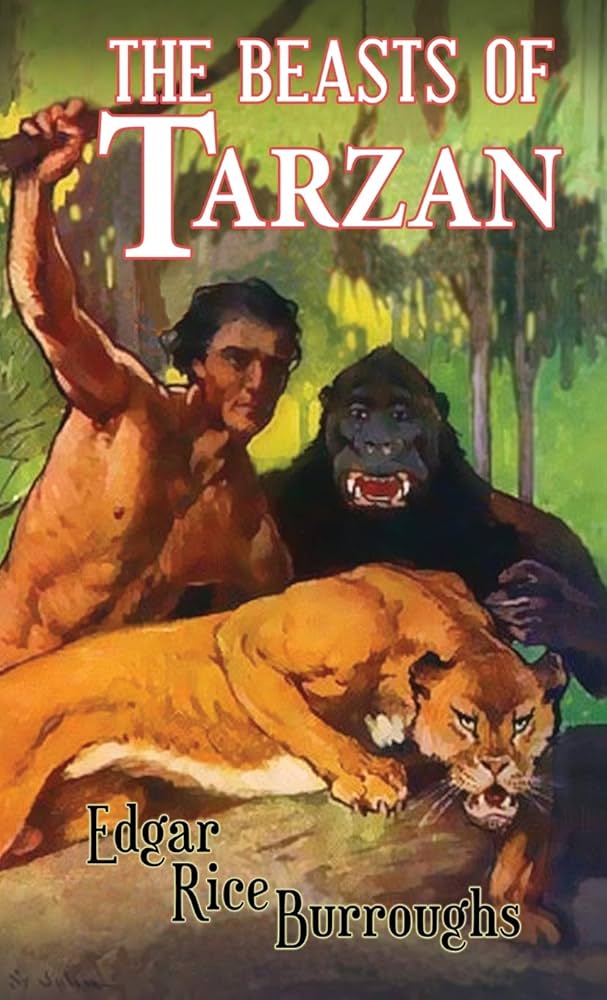Chapter 10 — The beasts of Tarzan
byChapter 10 – The Beasts of Tarzan begins with an intense clash between Tarzan’s unlikely band of allies and the native warriors. What unnerves the opposing tribe isn’t merely the physical strength of their enemies—it’s the haunting image of a panther fighting alongside a man and apes, moving with coordinated purpose. Though Tarzan is formidable, his hands are still bound, leaving him vulnerable. He attempts to communicate with Akut, but without success, the apes can’t understand his need for release. As daylight breaks, the natives regroup and prepare for a full assault, sensing their opportunity. Tarzan, aware of the dwindling hope, prepares for a brutal fight, unable to mask his despair.
Just when defeat seems inevitable, Mugambi emerges from the shadows and slashes through Tarzan’s bonds. The momentum shifts instantly, and with Tarzan free, the battle resumes with newfound ferocity. The strange coalition—human, panther, and apes—proves too unsettling for the native warriors. Fear overtakes strategy as their morale shatters. In the end, the warriors retreat, not from defeat in combat, but from the unnatural horror of what they cannot understand. Tarzan, no longer restrained, wastes no time interrogating one of the captured warriors for information. The name Rokoff surfaces again, and the direction he fled—upriver in a canoe—sets Tarzan’s course once more.
Relentless in his pursuit, Tarzan and his allies plunge into the dense jungle following Rokoff’s trail. However, the group faces setbacks—tropical heat, fatigue, and the diminishing number of allies begin to weigh heavily on their pace. Despite these hardships, Tarzan presses on, fueled by the thought of his captive son. The jungle around them, teeming with life yet indifferent to their struggle, becomes both a physical and emotional battleground. Each step through tangled undergrowth mirrors the internal war Tarzan fights between hope and hopelessness. In his eyes, every delay could be a moment lost that brings him further from his family.
A turning point comes unexpectedly during a chance encounter with Anderssen, the Swede who had been part of Rokoff’s original plot. A native warrior ambushes Anderssen, but Tarzan intervenes and saves his life. This act, unthinkable just days before, is driven more by instinct than rationale. Anderssen, wounded and humbled, makes a confession that shifts Tarzan’s perception of him. He speaks of his regret and how he tried to shield Tarzan’s wife and son from Rokoff’s worst intentions. Tarzan listens with caution but not without a flicker of empathy.
The Swede’s words ring with sincerity, even as he gasps in pain from a fatal arrow wound. He speaks not to save himself, but to offer guidance and redemption. This earnestness reaches Tarzan, who realizes that the man before him may have chosen the wrong side but not out of malice. In this revelation lies a crucial lesson: loyalty and treachery are often wrapped in layers of human complexity. Tarzan’s journey isn’t merely about defeating an enemy—it’s about discerning friend from foe in a world where motives are rarely pure. Anderssen’s death is not just a loss; it’s a reckoning. It humanizes the pursuit and gives it new emotional depth.
What emerges from this chapter is a narrative that transcends simple adventure. Trust is no longer black and white but a nuanced shade shaped by circumstance and choice. Tarzan, though always the fierce jungle protector, is also a man grappling with how to navigate relationships beyond survival. His bond with Mugambi and Akut reflects genuine respect, not mere utility. The alliance isn’t just about brute force—it’s about understanding and mutual purpose. This diverse camaraderie underscores how shared struggle forges deeper connections than shared species or language.
Tarzan’s character also evolves. No longer just a warrior of the wild, he becomes a man tempered by reflection, learning to value confession and sacrifice. His journey through the jungle now symbolizes something far greater than a path to vengeance—it becomes a test of heart. Tarzan’s grief, hope, and compassion coalesce into a new strength, one that elevates him beyond myth and into the realm of deeply human heroes. Even the beasts that fight alongside him seem to embody facets of his own soul: the ferocity, the loyalty, and the primal instinct to protect what matters most.
As this part of the tale closes, the reader is left with a vivid impression of a jungle teeming with danger but also rich in personal transformation. The complexity of characters like Anderssen brings layers of realism, reminding us that even within high adventure, there are quiet moments of moral reckoning. Tarzan’s mission to find his son gains urgency not just from love, but from a growing recognition of the high emotional stakes involved. In the tangled vines and perilous river paths, what he truly seeks is not just reunion—but redemption, understanding, and peace.

